Working title: The Word is Freedom
Okay, opening shot: a river swimming hole, kid's drowning. This handsome lifeguard jumps off his chair and dives into the water. There's splashing, crying, terrified moms, the whole thing, but the kid is saved. Cut to a montage of the same guy in a variety of movies--getting the winning touchdown, getting the girl, galloping around on a horse, mowing down Nazis from a plane, all his heroic characters at their peak moments. Exposition is standard biopic stuff: he marries, he becomes head of the Screen Actors Guild, he starts to see how Communists have infiltrated Hollywood. He divorces, dates around, finally he meets his true love and remarries. He takes a job as General Electric's spokesman, making speeches to workers about how much the company cares for them; he realizes he has a gift: people love him. He's folksy, he's handsome, he's charming: he runs for governor of California and wins! There's a bumpy start because he's not a politician, but we see him pull himself together and start to get things done. There's a great scene when he rides a horse six miles uphill to a summit in the Minaret Mountains--reporters hilariously trying to keep up--and makes a passionate speech against a proposed highway there. He's hailed as the "conservation governor."
Rising action is inspiring. We see him campaigning, against Nixon in '68 then Ford in '76--think of the cars! the costumes!--reviving the demoralized Republican party by giving voice to conservative issues: abortion, welfare reform, American military supremacy. He talks about the American dream and we see the faces of people learning to hope again. Before long, they're watching him make his inaugural address in 1981, saying "government is not the solution to the problem; government is the problem." Then we get to the real triumphant stuff: he's standing up to the air traffic controllers union, getting shot by a nut and surviving, he's hanging tough with Gorbachev at summits in Geneva and Iceland. We'll see him handling the hijacking of the Israel-bound ocean liner Achille Lauro: on his orders, American troops force down an Egyptian Air jet carrying the Palestinian hijackers to asylum and bringing them to justice instead. And of course, we see him in Berlin, demanding "Mr. Gorbachev, tear down this wall!"
Falling action: bam! The Iran-Contra scandal. But we see how his subordinates, National Security Advisor Robert McFarlane and his deputy Oliver North, ran the whole thing. We see the president testify that he had no idea what was going on. Then--even though he's risking his legacy--he has the decency to get up and take responsibility for the whole mess. So the resolution is a triumph too. The close is his final success: he goes to Moscow to meet with Gorbachev one last time. We see him jumping out of his car in Moscow and shaking hands with average Russians, until KGB goons start beating everyone up. Final scene is him making a speech to Russian human rights activists. He says "Political leadership in a democracy requires listening to the cacophonous voices of ordinary people. And the word we have for this is 'freedom.'" We see the audience transfixed. Then, superimposed over their faces, footage from the end of the Cold War: Ukrainians marching in the street, Lithuanians blocking tanks, Germans busting down the Berlin Wall, statues of Lenin being pulled down, Gorbachev resigning on television.
It's Air Force One, Lincoln, and Thirteen Days, all rolled into one. And it stars the Gipper!
Working title: Is He Serious?
Get this: we start at the end. We're in a study in the ex-president's home, and he's standing at a window while his wife listens to a doctor tell her that her husband has Alzheimer's. And as the guys stares out at the California landscape, the scene fades to what he's thinking about: his secret testimony before the Tower Commission, the special group formed to investigate whether his administration illegally traded arms for hostages. And he's repeating a few phrases over and over: "I don't know." "I don't remember." "I don't recall."
Chyron: "13 years earlier." He's making his inaugural address. He's telling a folksy story. But as he's talking, we see two guys watching from the audience: his speechwriter and a friend. The friend says "Hey, you wrote this speech. Isn't this story he's telling from a movie?" And the speechwriter glumly says, "It's not the only fiction in there. He wouldn't let me take them out." And now we know we're gonna go through the whole presidency and see how crazy it all was.
We'll see him on the campaign trail retailing stories from crackpot characters and fringe magazines as actual fact. Saying Alaska has more oil than Saudi Arabia, "welfare queens" are raking in six-figure salaries--stuff like that. He's embracing supply-side economics even as his own budget director admits that the numbers don't add up. He's building up the military but coming up with harebrained ideas like writing Leonid Brezhnev a private letter suggesting they get together and make peace, one-on-one. We'll see his briefings being pared down to a few pages with bullet points and even then, he's napping. He's proposing the Strategic Defense Initiative, a space shield to repel nuclear weapons, even as his own military advisors tell him it's a total pipe dream. "Is he serious?" asks the chairman of the Joint Chiefs of Staff.
And it gets worse: a whole new crop of neocons are inspired by him. Phyllis Schlafly is telling women to get back in the kitchen; Anita Bryant is campaigning against gay rights; corporate honchos are running amok. It all comes together in his campaign for re-election using the slogan "Let's make America great again." When he's debating Walter Mondale, the president seems muddled, losing his train of thought, admitting "I'm all confused now." But he wins anyway because people just like him. But in his second term it starts to come apart at the seams. We'll see his ham-handed dealing with the hijacking of the Achille Lauro: violating Italian sovereignty by trying to grab the Palestinian hijackers after forcing down a civilian plane on Italian soil. It causes such an uproar in Italy it results in the resignation of the prime minister. His famed sit-downs with Soviet premier Mikhail Gorbachev are more storytelling than substance--the president tells Gorbachev he's sure the superpowers would cooperate if there was an alien invasion, as if they're in a sci-fi flick. Gorby is thinking "this guy's nuts!" But afterward his press secretaries make up lines like "The world breathes easier because we met" and tell the press he said them.
The narrative climax comes when the president approves an illegal plan to secretly sell embargoed arms to Iran in exchange for their help convincing Hezbollah to release American hostages. Of course Iran is playing him: Hezbollah is in Lebanon for god's sake! Which is what his National Security Advisor and his Secretary of Defense say, trying to talk him out of it. But when the plot is revealed, he tells the media that all his senior officials were on board. As the scandal grows, revealing that money from the arms sales was diverted to the right-wing Contras to help them overthrow the government of socialist Nicaragua, the president seems more and more confused and disengaged. Until we come back around full circle to the Tower Commission, and his inability to remember that he ordered the whole thing.
After that there's nothing left but to wind down with vignettes from his final days, puttering around on his ranch, wandering off in restaurants to shake hands, running into former aides and not knowing who they are, until finally his wife pulls him out of the public eye and it's just the two of them, alone in their house, doing puzzles--yeah, we're not sure they did puzzles, but it's a nod to Citizen Kane because this film is Citizen Kane if Charles Foster Kane had been one of the guys in Awakenings.
Working title: Ladies' Man
Opening titles roll over a midwestern town. Grain elevator, railroad tracks, Main Street, the works. Dollying in, we see a boy, 10 or so, walking home. He gets to a modest house and climbs the stoop. And there, spread-eagled and face-down, he sees his dad. Drunk. He looks up: his mother is at the screen door. She sees drunk Dad too. She and the son lock eyes, and she turns away, fifteen years of disappointment in the stoop of her shoulders. The boy turns back to his father, then drags him inside.
Quick sequence of scenes from a childhood, always with the mother. She's taking him to the prayer meeting. She's taking him to do community theater. She's reading with him at night. But then one day, he comes home and mom's waiting but hold on, he's got a girl with him. And he's carrying her books. And we know from the look on mom's face that this is the end of her reign. Dissolve to a leafy quad, a brick college campus in autumn. Tracking shot to a car nearby. In it, the guy and the girl from earlier are getting hot and heavy. The usual scenes of college life, and then the girl's telling him she's pregnant. (We don't know for sure that she was pregnant, but in real life, the gal did disappear for six months with no record of where she went, so you tell me.) Anyway, that's that. We now get the guy to Hollywood; and introduce him to the gossip columnist Louella Parsons. She's totally gaga over him, and we can tell she's on a mission: she's gonna make this guy a star. And the whole next section is accompanied by voiceover from her column: the Hollywood actor is making a Western; he's dating his co-star; he's on the set of a war film; he and the starlet are a hot item; he's making a film about football; rumors of marriage; now they're getting married; he's making a new film with Shirley Temple; now there's talk that the marriage is on the skids. Then we lose Louella and we see the unhappy couple at home, and he's driving her crazy talking about articles he read in Readers Digest and she's rolling her eyes. Cut to divorce court. Then Louella's voiceover comes back for a whole succession of starlets, galas, premieres, the Brown Derby.
But then this one actress, a real determined sort, sets her mind on him. We see her pursue him and he's evasive, but she's a go-getter, and one day we see her figure out just the expression of blank adoration to put on her face while he's talking, and he's totally charmed but still not in the bag so the day comes when she tells him she's pregnant. Cut to the wedding. And here's the thing: we're only halfway into the film. For the rest of it we watch this little gal turn this B-actor into the most powerful man on the planet--running his staff, shaping his image, guarding his schedule, making sure he gets the sleep he needs, serving him dinner on TV trays so he can watch the tube and wind down after everything she's got him doing. He's a one-trick pony--wind him up and put him in front of an audience and he trots out folksy stories and political platitudes and people love him, but the wife, she's micromanaging every detail, from the overall strategies down to how the assistants cut their hair.
She's deciding who's hired and who's fired; she's telling him what his policies are. In particular, she's determined to secure his place in history, so she strong-arms him into meeting with the Soviets. And she's covering for him when he gets confused, she's keeping anyone from seeing him when he's out of it, until the whole Iran-Contra scandal hits, and then suddenly she stops covering for him. And he goes before the Tower Commission and says "I don't remember, I don't recall, I don't know" until they're tearing their hair out. But this was her genius, see? They can't even pin anything on him, because after all the shredding of documents, there's no reconstructing what the president knew and when he knew it. He leaves office one of the most beloved presidents ever and we see on his wife's face exactly who engineered that.
In the wind-down we see her covering for his confusion when he's old and demented, and then to the close where she's at his funeral, and someone comes up to her and says "Oh, he was a real ladies' man," and she gives the guy a cold stare and says "Yes, he was." And we get it--he was a ladies' man not in the popular sense of a success with the ladies, but in the sense that ladies, and particularly this lady, actually made him. It's like The Manchurian Candidate if Angela Lansbury was married to Lawrence Harvey, without the part where he figures it out and kills her. And it's based on a true story!


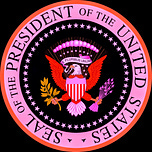

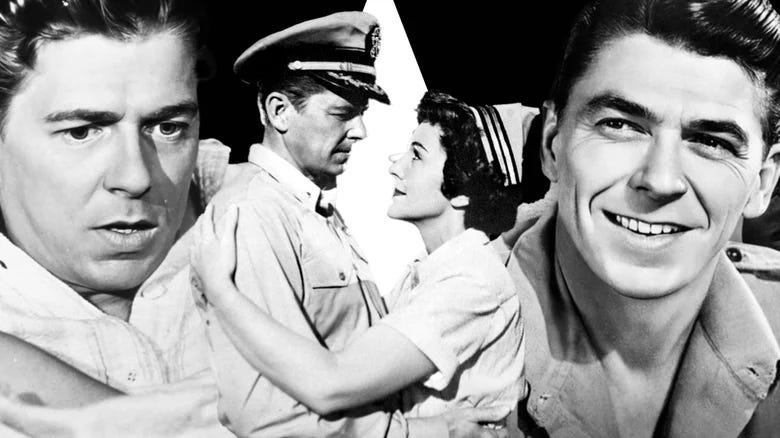

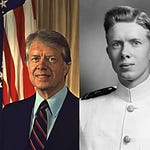
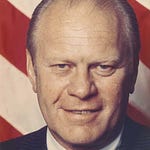


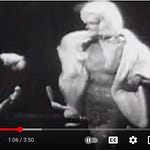
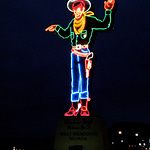
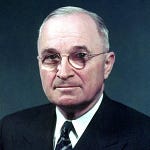
40: Ronald Reagan